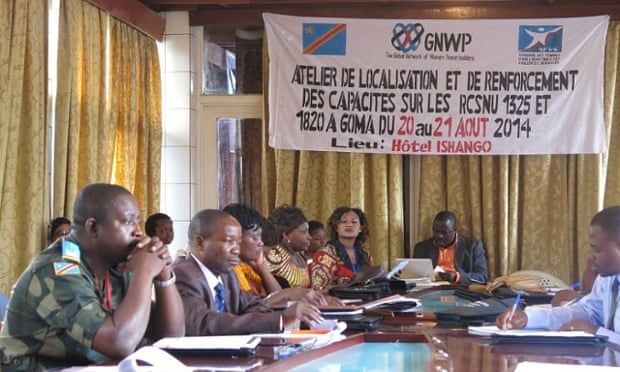Women, Peace & Security
Source: The Guardian
In 2000 the United Nations security council passed resolution 1325 which vowed to ensure that women and gender equality were placed at the forefront of international, regional and local peace-building and security policies.
But 15 years later resolution 1325 is handicapped by woeful underfunding and women remain largely on the periphery at a time when enlisting their talents in the cause of peace and to combat extremism has never been so badly needed.
Every day we hear about radicalisation and its devastating impact: families losing their sons or daughters to Isis in Syria or Iraq; the massacre in a school in Pakistan; Boko Haram's kidnapping of more than 200 girls in Nigeria; and al-Shabaab's attack on a mall in Nairobi.
The international community's response is to eliminate violent extremism with military might, while at home governments spend billions on security measures.
Those responses are deemed to be necessary, but do we really think we can wipe out extremism and violence by applying extreme violence? Shouldn't we focus more prominently on tackling the causes of radicalisation? If we don't give people a perspective on human security, justice, schooling, health services, skills, and a basic income, there will always be a next generation of extremists.
To create these perspectives in hotbeds of extremism such as Syria, Libya, Nigeria, and Afghanistan, thousands of local peace campaigners, community leaders and human rights activists, including many women, are risking their lives.
But women are working at a considerable disadvantage and as long as we, the international community, do not give our full political and financial support to their peace-building and state-building efforts, we will only see more violence in the future, however large the military response. By failing to take women and girls on board in issues of peace and security, the world loses a lot of its potential power to counter violent extremism.
Resolution 1325 gave us the political framework to get women on board and to change the perception of women from victims to decision-makers in conflict resolution processes. Yet 15 years later, donor countries invest billions in military security to counter violent extremism, but fail to allocate the resources to implement 1325. This lack of political will to generate adequate funding deprives the world of a most effective response to radicalisation.
 Implementing resolution 1325 … Global Network of Women Peacebuilders workshop in Goma, DRC, in August 2014. Photograph: GNWP
Implementing resolution 1325 … Global Network of Women Peacebuilders workshop in Goma, DRC, in August 2014. Photograph: GNWP
Take the Afghan Women's Network (AWN), a network of more than a hundred women's organisations and 5,000 courageous individuals. They work tirelessly in perilous conditions to push for the implementation of resolution 1325 and also take part in rebuilding the country. They fought and survived Taliban rule. They risked their lives by casting a vote in the 2014 presidential elections. They refused to go back to square one. And their struggle continues.
Afghan women remain shamefully under-represented in government. More than a decade after Taliban rule, "rights that should be handed to us are not recognised. We still have to go to the streets to take them", says Samira Hamidi, board member of AWN.
In 2000 the world promised to support women who dismantle the culture of violence and promote gender equality in the direst of situations. We broke that promise. Only 46 out of 193 UN member states have developed national plans on resolution 1325. None of these plans have yet received adequate funding. And as Hassina Safi, AWN director, puts it: "If our pocket is empty, we cannot do anything. If we have little money, are planned and strategised, we can really trouble shoot a lot of problems."
The costs of inaction are high. Women are active agents of change in their communities and societies. Preventing them from using their full economic, peace-building and state-building potential in their countries is a threat to global security.
So how can we pressure governments to put their money where their mouths are? The framework of security council resolutions is clearly not enough. What we need now are sustainable and effective funding mechanisms to back their implementation.
Building on the mandate of resolution 1325, UN Women, Cordaid and the Global Network of Women Peacebuilders (GNWP) led the formation of a discussion group. At the first meeting in June 2014, the members embraced the idea of establishing a five-year mechanism to address the shortfalls in quality funding, titled a global acceleration instrument (GAI) on women, peace and security.
But the GAI envisaged by the group, which also includes donor governments and post-conflict UN member states, would be more than a financial mechanism. It would also act to empower women in the forefront of the struggle for gender equality and human rights in areas of armed conflict.
Several member states have been very active in supporting the GAI, in particular Japan and Sierra Leone, which both have government representatives on the committee preparing the detailed proposal for the GAI. Sierra Leone is also championing collaboration with local NGOs, and Japan has demonstrated its commitment to support the initiative.
UN secretary general Ban Ki-Moon underlined that "adequate financing [of resolution 1325] remains a pervasive challenge". Capitalising on the momentum of the 15th anniversary of 1325, Cordaid, GNWP and UN Women aim to launch the GAI in October 2015. At the 59th session Commission on the Status of Women from 9-20 March, we will call on leaders and policy makers all over the world to follow the example of Sierra Leone and Japan.
After 15 years of promises, it's time to act and to pay. Without women and their leadership in peace and security issues, a peaceful future barely stands a chance.
